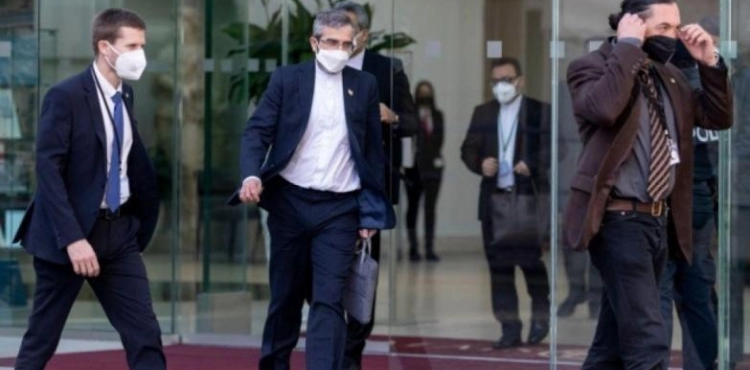The Iranian Foreign Ministry announced today, Wednesday, that a delegation headed by chief negotiator, Ali Bagheri Kani, will head to Vienna in the coming hours, in order to complete discussions on reviving the nuclear agreement, which have been suspended for months.
The European mediator, Enrique Mora, also confirmed that he was going to Vienna to complete talks with Iran, while a senior US official said that Washington´s envoy to Iran, Robert Malley, would go to Vienna to participate in the nuclear negotiations.
This comes days after the European Union Foreign Minister, Josep Borrell, who is coordinating the talks to revive the agreement, presented a draft proposal to Tehran and Washington in an attempt to conclude a settlement that would reactivate the understanding from which the United States withdrew in 2018.
According to estimates reported by international news agencies, the expected round of talks will resume tomorrow, Thursday.
"Within the framework of the policy of lifting the unjust sanctions against our country, the negotiating team of the Islamic Republic of Iran headed by Ali Bagheri Kani (...) will head to Vienna within hours," the ministry´s spokesman, Nasser Kanaani, said in a statement.
Al-Kanaani said that "Iran is determined to reach a stable agreement that guarantees the rights and interests of the Iranian nation," calling on Washington to "provide the appropriate conditions to achieve effective progress in the talks by taking the necessary decisions."
A senior Iranian official told Reuters that the Vienna talks would be "in the same form as the Doha meeting", where the European Union envoy, Enrique Mora, shuttled between Bagheri Kani and Mali, because Tehran refused to hold direct talks with Washington.
Earlier today, Mora said on Twitter that he was "on my way to Vienna to discuss returning to full implementation of the JCPOA (nuclear deal) based on the text put forward by the coordinator on July 20."
A US official, speaking to Reuters today, also confirmed that Washington´s envoy to Iran, Robert Malley, will travel to Vienna for talks this week, with the aim of reviving the 2015 nuclear deal, without providing further details.
For his part, Mali later confirmed, in a tweet on Twitter, that he was heading to Vienna to complete the talks on the basis of the proposal made by Borrell, and said: "The United States welcomes the efforts of the European Union, and is ready - in good faith - to try to reach an agreement. It will soon become clear what If Iran is ready for that.
In turn, Bagheri Kani, in a tweet on Twitter, considered that the ball is in the court of the United States, and called on Washington to "show maturity and act responsibly," and said that "the United States should seize the opportunity provided by the generosity of the JCPOA partners."
The Russian envoy to the nuclear talks with Iran said that Russia is ready to participate in constructive talks aimed at saving the nuclear agreement; Mikhail Ulyanov wrote on Twitter: "It seems that the Vienna talks on reviving the JCPOA will resume soon... Russian negotiators are ready to hold constructive talks in order to finalize the agreement."
The agreement concluded in 2015 between Tehran and Washington, Paris, London, Berlin, Moscow and Beijing allowed the lifting of sanctions on the Islamic Republic, in return for reducing its nuclear activities and ensuring the peace of its programme.
However, the United States unilaterally withdrew from it in 2018 during the era of its former president, Donald Trump, re-imposing harsh economic sanctions on Iran, which responded by gradually withdrawing from most of its obligations under it.
Iran and the powers affiliated with the agreement began discussions to revive it in April 2021 in Vienna, with the indirect participation of the United States and facilitated by the European Union.
Despite achieving great progress in the negotiations, the talks were suspended last March, with points of disagreement remaining between Tehran and Washington that the stakeholders have not yet been able to bridge the gap.
In late June, the two sides held indirect talks in Doha with the facilitation of the European Union, which ended without achieving a breakthrough. On July 26, Borrell revealed that he had submitted a draft understanding to Tehran and Washington.
He wrote in an article published in the "Financial Times" newspaper that his proposal "is not an ideal agreement", but "it represents the best agreement that I consider possible, as a mediator in the negotiations," noting that it "addresses all the basic elements and includes settlements that all parties obtained with difficulty."
He warned that in case of refusal, "we risk a serious nuclear crisis."
Kanaani had confirmed in a press conference, Monday, that Iran had studied Borrell´s proposal and "presented its point of view," stressing that his country remains "optimistic" about the possibility of reaching an understanding to revive the agreement.
In his statement today, the Iranian spokesman said, "In this (next) round of talks, which will take place, as in the past, coordinated by the European Union, the ideas that were presented by the parties, including those presented this week by Iran to the party, will be discussed. the other".
Kanaani expressed his hope that "the opposite parties will resolve the situation by taking the necessary decisions and seriously focusing on resolving the remaining problems."
Indirect talks brokered by the European Union between Bagheri Kani and Washington´s special envoy to Iran, Rob Malley, aimed at breaking the deadlock on how to save the nuclear agreement, ended last June in the Qatari capital, Doha, without progress.












